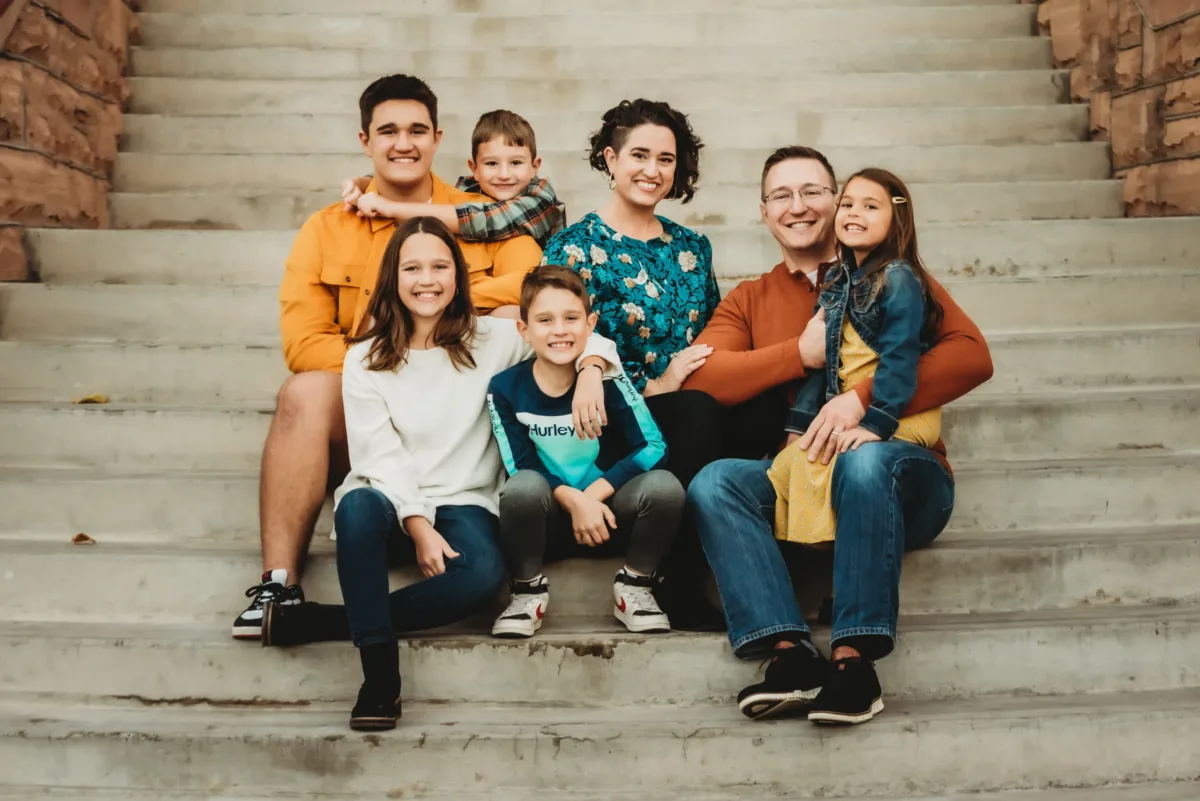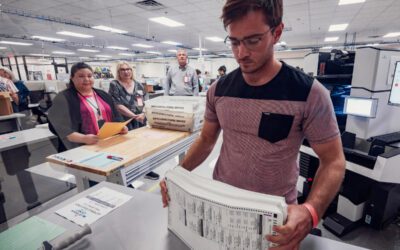
(Photo courtesy of Lacy Chaffee)
Voters rejected $500 million for Mesa Public Schools.What happens now?
Lacy Chaffee went to Mesa Public Schools from kindergarten through high school, and now sends her five children to Mesa schools. She’s invested in the quality of education the district provides—but after a recent school bond election failed by an ultra-thin margin, she’s worried that her fellow voters aren’t getting the facts about what local schools need.
“I have a third grader who started this year with no air conditioning in his classroom,” she said. “It was miserably hot, and as parents, we had to fundraise to get fans and functioning water in his classroom.”
This past September, the average temperature in Mesa was 98 degrees.
Basic infrastructure like air conditioning, secure entrances, and modern learning facilities were all part of Mesa Public Schools’ $500 million bond proposal, put to voters in the November 2023 election. Bonds like this one have largely funded Mesa schools’ capital expenses for decades—but this year, the ballot proposal was up against a misinformation campaign and growing distrust sowed by Republican lawmakers. The final tally came in at 50.94% of votes against the bond proposal, and 49.06% in favor.
“I think it was disheartening to teachers and administrators to feel like, ‘Is our community behind us?’” Chaffee said. “I think for teachers and administrators, they’re definitely feeling a little discouraged, at this point.”
Not helping the teacher shortage
When the 2023-2024 school year started, there were 7,518 openings for teachers in Arizona, according to a survey by the Arizona School Personnel Administrators Association. The state has also had one of the highest turnover rates in the country—due in part to concerns over salaries and working conditions. According to the Learning Policy Institute, Arizona ranked second-to-last for wage competitiveness in 2020.
“It’s a hard job, and not having the basics of what you need to have for a good learning environment is hard,” Chaffee said.
Earlier this year, Democratic Governor Katie Hobbs launched an Education Retention Task Force designed to make recommendations on the ongoing educator crisis.
“The reality is: we don’t have an educator shortage, what we have is a retention crisis,” Hobbs said in her March 30, 2023 announcement.
The task force released its final report, along with 11 recommendations, earlier this month. More than a third of those deal with teacher salaries and compensation.
Keeping teachers in their jobs is key for parents like Chaffee.
“One thing that I’d really like to see Mesa Public Schools do is retain teachers,” she said. “We have a lot of young teachers, and I think that we need ways to make the teaching profession sustainable and make sure that we keep these amazing teachers that are coming to teach here.”
Another factor hitting Mesa’s schools hard is per-pupil spending. According to the US Census Bureau, Arizona was second-to-last in nationwide per-pupil spending in 2022, at $10,330. The national average was $14,347.
“We have enough to barely maintain the things that we have, but not to make the upgrades that are very important,” Chaffee said. “And I think that’s a problem that shouldn’t be partisan.
“We should believe that kids and teachers should have safe, healthy learning environments where they can function, and we live in an area where we could do that.… And as a parent, I want to make sure every kid has access to a good classroom environment.”
What’s the disconnect here?
It likely isn’t a huge leap to suggest most people want students to get the best education possible. But voting doesn’t always reflect that desire.
Prior to the election, local supporters of the bond proposal hand-wrote nearly 19,000 postcards to voters and knocked on thousands of doors.
Mesa City Councilman Mark Freeman represents northwest Mesa. He voiced his support for the bond, but said he noticed a more concerted effort by those who oppose bonds to get the measure to fail.
“There’s some angst out there over bonds in general,” Freeman said. When election day came around, only 69,302 of the 270,863 eligible voters in the Mesa School District turned out.
Freeman said he saw antagonism against the measure because to many people, bonds signal more taxation.
“This was not an increase in taxes,” he said. “It was a continuation [at the current tax rate] if the bond had been approved. The tax rate would’ve been unchanged.”
Other parts of the opposition came in part from a campaign against the bond by local Republican leaders, who’ve said they’re frustrated by students’ assessment scores—which fall just below statewide proficiency rates—and that they feel school districts are “poor stewards of taxpayer dollars,” according to reporting done by AZCentral.com.
The answer to raising the quality of education, bond supporters argue, is getting facts about the district to voters, and empowering those voters to better fund the schools. Without adequate infrastructure, staffing, and resources, schools can’t ever catch up.
“I think some parents believed a lot of this partisan political messaging that terrible things are happening in our schools,” Chaffee said.
What happens next?
There’s still a chance to get the funding Mesa schools need—but it’d take another election.
“We might have different turnout in a presidential year, so it might be worth it,” Chaffee said.
“I anticipate another bond being presented in the 2024 general election, and we’ll see how voters move forward with that,” Freeman said. “I just think bonds are a necessary part of funding our education system.”
“I wish that the state legislature would fund education at a level that was fair for all students,” Chaffee said.“[It’s] good for all of us. That’s good for democracy. That’s good for the economy. When our students are getting educated, they’re graduating from high school, they’re going on to college and careers with skills and a passion and engagement. That’s the kind of thing we want to keep seeing in Arizona.”
Are you ready to vote? Make sure to check your voter registration status, see who’s on your ballot, and make a voting plan here.
Support Our Cause
Thank you for taking the time to read our work. Before you go, we hope you'll consider supporting our values-driven journalism, which has always strived to make clear what's really at stake for Arizonans and our future.
Since day one, our goal here at The Copper Courier has always been to empower people across the state with fact-based news and information. We believe that when people are armed with knowledge about what's happening in their local, state, and federal governments—including who is working on their behalf and who is actively trying to block efforts aimed at improving the daily lives of Arizona families—they will be inspired to become civically engaged.


Republican Rep. Juan Ciscomani wins reelection to Arizona US House seat
Juan Ciscomani won his first term in 2022 when he beat Kirsten Engel by over 5,200 votes. PHOENIX (AP) — Republican Rep. Juan Ciscomani won...

No, Elon Musk did not hack Arizona’s election results with Starlink
Only three Arizona counties use Musk's Starlink, and two of them voted for Kamala Harris. As President-elect Donald Trump begins filling key posts...

Why AP called the US Senate race in Arizona for Ruben Gallego
The AP only declares a winner—in this case, Ruben Gallego—once it can determine that a trailing candidate can’t close the gap and overtake the vote...

Women have led other democracies, but US voters rejected the 2 who tried—what will it take to elect a female president?
In the United States, 45 men have served as president, starting with George Washington in 1789. Donald Trump’s reelection extends that streak....





